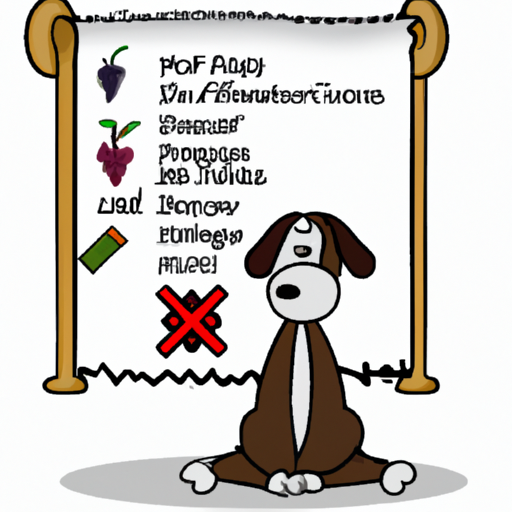As a loving pet parent, you’re probably aware that not all human foods are safe for your furry friend. Some foods, while delicious and healthy for humans, can be dangerous – even lethal – for dogs. That’s why it’s crucial to know what’s safe to share with your canine companion. In this comprehensive guide, we’ll dive into the details of foods that your furry friend should avoid.
1. Harmful Foods for Dogs
Let’s start by exploring the most hazardous foods for dogs. These are foods that should always be off-limits.
Chocolate, Coffee, and Caffeine
These products all contain substances called methylxanthines, which are found in cacao seeds. When ingested by dogs, methylxanthines can cause vomiting, diarrhea, panting, excessive thirst and urination, hyperactivity, abnormal heart rhythm, tremors, seizures, and even death.
Grapes and Raisins
The toxicity of grapes and raisins to dogs is well-documented, although the exact substance that causes the reaction is not known. Ingesting these fruits can lead to sudden kidney failure in dogs.
Alcohol
Alcohol affects the brain and liver in dogs just as it does in humans. But even small amounts can lead to serious toxicity.
Onions and Garlic
Onions and garlic can cause gastrointestinal irritation in dogs and can lead to red blood cell damage. While it’s true that cats are more susceptible, dogs are also at risk if a large enough amount is consumed.
2. Foods To Be Wary Of
While the foods in this section are not immediately life-threatening, they can still pose health risks to your dog.
Dairy Products
While not inherently toxic, many dogs have varying degrees of lactose intolerance. Consuming dairy products can lead to digestive upset in these dogs.
Raw Eggs
Feeding your dog raw eggs carries the risk of foodborne illnesses like salmonella. Additionally, raw eggs contain an enzyme called avidin that decreases the absorption of biotin, a B vitamin. This can lead to skin and coat problems.
Salt
Just like with humans, consuming too much salt can lead to increased thirst and urination in dogs, and in severe cases, it can lead to sodium ion poisoning.
Sugary Foods
Excessive sugar intake can lead to obesity, dental health issues, and even diabetes in dogs.
3. Safe Foods for Dogs
Now that we’ve covered what your dog can’t eat, let’s look at some foods that are safe for your dog to consume. Remember, even these should be given in moderation.
Peanut Butter
Peanut butter is a good source of protein and healthy fats for dogs. Just make sure it doesn’t contain xylitol, an artificial sweetener that’s toxic to dogs.
Chicken
Cooked chicken is a great source of protein that dogs can easily digest.
Carrots
Carrots are low in calories and high in fiber and vitamins, making them a great snack for dogs.
Apples
Apples are a good source of fiber and vitamin A and C. Just make sure to remove the seeds and core first.
4. How to Prevent Accidental Ingestion
Here are some tips on how you can prevent your dog from eating harmful foods:
- Keep hazardous foods out of your dog’s reach.
- Train your dog to obey commands like “leave it” or “stay.”
- Don’t leave food unattended.
- Keep trash cans covered.
5. Frequently Asked Questions
Can dogs eat fruits and vegetables?
Most fruits and vegetables are safe for dogs to consume, but some, like grapes and onions, can be toxic. Always research a food before giving it to your dog.
What should I do if my dog eats something harmful?
Contact your vet immediately or call a pet poison control center.
Are there any safe human foods for dogs?
Yes, many human foods are safe for dogs. Some include peanut butter, chicken, carrots, and apples. Just remember to feed these in moderation.
What are some signs my dog has eaten something harmful?
Signs can vary depending on what was eaten, but common signs include vomiting, diarrhea, excessive thirst, and lethargy. If your dog displays any of these signs, contact your vet immediately.
By being aware of what your dog can and can’t eat, you can ensure they stay happy and healthy. Always consult with your veterinarian if you have any concerns about your dog’s diet.



